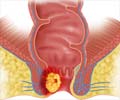Hospitalization of TV actress Farrah Fawcett, 62, this week has turned the media attention to anal cancer.
Hospitalization of TV actress Farrah Fawcett, 62, this week has turned the media attention to anal cancer. Back in 2006 she was diagnosed with the disease. She has not publicly confirmed the specifics of her illness, but is working on a documentary, titled ''A Wing and a Prayer,'' about her health battle.
Anal cancer is less common than rectal and colon cancer, and the location of the tumor and risk factors make people squeamish about discussing it openly, doctors said.Anal cancer affects more women and the illness is usually found in people who are in their early 60's. The American Cancer Society estimates that 5,000 new cases of anal cancer are diagnosed each year and about 680 people die from it annually. Meanwhile, colorectal cancer has 148,000 new cases and about 50,000 deaths each year.
Colon cancer at one time also was not openly talked about, because of the body part and functions affected, but with the public awareness campaigns and celebrities advocating for screenings, it has been largely destigmatized. Anal cancer is less familiar, CNN reported.
When anal cancer is caught early, chemotherapy and radiation are highly effective. But if the cancer doesn't respond to treatment and spreads to other areas of the body, the five-year survival rate plummets to 20 percent, said Dr. Cathy Eng, associate professor in the department of gastrointestinal medical oncology at the University of Texas M.D. Anderson Cancer Center.
''Anal cancer is unique,'' she said. ''The majority of time you can cure the patient, but if you have recurrent or residual disease, you could end up losing your sphincter.''
The sphincter are muscles that holds in urine and feces. If the sphincter is removed, the patient must have a special bag, called an ostomy pouch, that collects the waste.
Advertisement
Cultural squeamishness about certain body areas could prevent early diagnosis and treatment of anal cancer, said Dr. Petr F. Hausner, an associate professor of medicine at the University of Maryland Medical Center in Baltimore, Maryland.
Advertisement
The cultural discomfort might be a minor factor, though.
''The bigger role is the virus,'' he said referring to the human papilloma virus, a key risk factor for anal cancer that also can cause cervical cancer. Getting vaccinated against HPV is a step in prevention, Hausner said.
More than half of anal cancer patients experience bleeding as a symptom. Others have no symptoms or report common conditions, such as hemorrhoids, fissures, or warts. Symptoms also include itching or pain in that area, changes in the diameter of stool, abnormal discharge, swollen lymph nodes in the anal or groin areas, according to the American Cancer Society.
Anal pap smears are routine only for HIV-positive patients, who are at higher risk for this cancer. There are no anal cancer screening recommendations for non-HIV individuals, because it remains a rare disease, Hausner said.
People whose immune system are suppressed, from HIV or drugs taken after organ transplants are at risk for anal cancer. Other risk factors include a sexual history with many partners, a medical history of human papilloma virus (HPV), sexually transmitted diseases or gynecological cancers.
Source-Medindia
GPL/S













